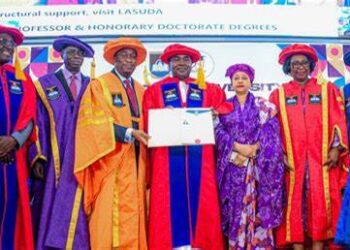The Abuja Division of the Federal High Court, on Wednesday, declined to stay execution of the judgment that sacked Senator Peter Nwaoboshi, who was re-elected on the platform of the Peoples Democratic Party, PDP, to represent Delta North Senatorial District.
The embattled lawmaker had through his lawyer, Mr. Selekowei Larry, SAN, approached the high court, praying it to suspend the execution of its judgment that ordered the Independent National Electoral Commission, INEC, to recognize Prince Ned Nwoko as the authentic candidate of the PDP for the Senatorial District.
He urged the court to order all the parties to hold on, pending the determination of an appeal he lodged before the Court of Appeal in Abuja.

However, in a ruling, Justice Ahmed Mohammed refused the application on the premise that the high court had become functus-officio in the matter.
The trial Judge ordered all the parties to go before the appellate and ventilate their case, stressing that record of proceedings in the matter had already been compiled and transmitted to the higher court.
Justice Mohammed held that the embattled lawmaker was at liberty to persuade the Court of Appeal to stay execution of the judgment against him.
It will be recalled that the high court had on April 3, held that Nwaoboshi was not validly nominated in the primary election the PDP held in Delta State on October 2, 2018.
The court, aside directing INEC to recognise the plaintiff, Prince Nwoko, also ordered Senator Nwaoboshi who was the 3rd Defendant in the case, to stop parading himself as candidate of the PDP for the constituency.
The plaintiff had in a pre-election suit he filed before the court, alleged that PDP leadership, illegally submitted Nwaoboshi’s name to INEC after he lost the primary contest.
In the Originating Summons he filed on December 11, 2018, Prince Nwoko, urged the court to among other things, determine whether INEC which supervised the primary election of the PDP and knew that he won majority votes cast, was not wrong to accept and publish Nwaoboshi’s name as PDP’s candidate for the Senatorial poll.
He also urged the court to determine whether by mandatory provision of the Electoral Act, INEC, was not bound to publish his name as the bonafide winner of the Delta North Senatorial primary, having secured the highest number of votes.
More so, the plaintiff, prayed the court to determine whether the continued display of Nwaoboshi’s name instead of his own, does not constitute a violation of the Constitution, Electoral Act and INEC’s Guidelines for the conduct of primary election.
He asked the court to declare that the publication of Nwaoboshi’s name, after he lost the primary election, was illegal and unconstitutional.
The plaintiff, aside alleging that Nwaoboshi used illegal delegates during the primary, told the court that the Senator-elect hired thugs to cause stampede when he learned of his imminent defeat.
He described result sheet that was eventually returned by organisers of the primary election, wherein he got 453 votes as against Nwaoboshi’s 506 votes, as “a fraud and sham”.
The plaintiff subsequently secured an order of the court for all the ballot papers that were used for the primary election to be brought and counted before the court in the presence of representatives of all the parties.
In his judgment, Justice Mohammed noted that though the order for production of the ballot papers was directed to the PDP, however, it was Nwaoboshi that vehemently opposed the order.
The court held that PDP ought to have exhibited the ballot papers it said were used in the conduct or the election, since it failed to comply with the order that directed it to produce the ballot papers to be recounted.
Relying on section 167 of the Evidence Act, Justice Mohammed held that action of the PDP indicated that the Plaintiff would have won if the ballot papers were brought before the court.
He dismissed all the preliminary objections the PDP, Nwaoboshi and INEC lodged against the suit.
The court held that the suit was not status barred, saying it has the requisite jurisdiction to entertain same.
The Defendants had in their objections, argued that the suit, was caught by section 285(9) of the 4th Alteration to the 1999 Constitution that prescribed 14 days for filing of pre-election matters.
They argued that the suit was filed over 65 days after Nwaoboshi’s name was submitted to INEC.
However, the court noted that the Plaintiff had earlier instituted an action before an Abuja High Court to challenge the outcome of the primary election.
It held that though the Plaintiff subsequently withdrew that suit, he instituted the instant action after his petition against the outcome of the primary poll was ignored by PDP’s appeal panel.
Nwaboshi who is currently occupying the disputed senatorial seat, had since gone to the appellate court to set-aside the high court judgment he said occassioned a grave miscarriage of justice against him.








